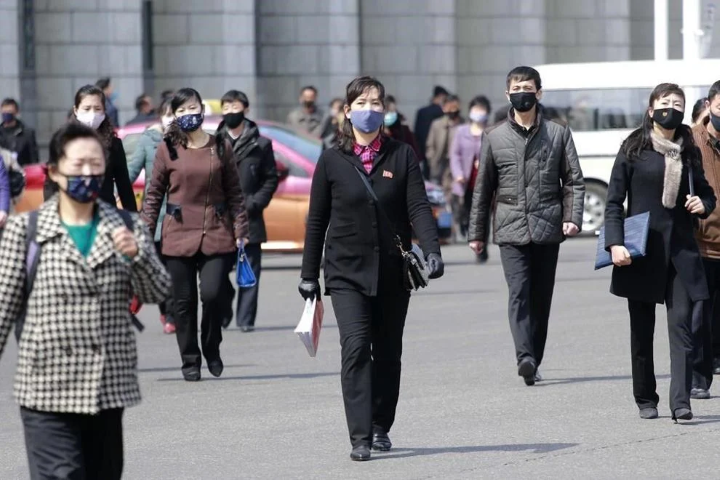
Pedestrians wear face masks to help prevent the spread of the new coronavirus in Pyongyang, North Korea, on April 1, 2020. North Korea is putting surveillance cameras in schools and workplaces, and collecting fingerprints, photographs and other biometric information from its citizens in a technology-driven push to monitor its population even more closely, a report said Tuesday, April 16, 2024.
In a recent report, it has been revealed that North Korea is intensifying its surveillance measures by installing cameras in schools and workplaces and gathering biometric data such as fingerprints and photographs from its citizens. This technology-driven approach aims to closely monitor the population, reducing spaces for private activities and criticism of the government.
The state's increasing reliance on digital surveillance tools, incorporating equipment from China alongside domestically developed software, poses a threat to the limited freedoms North Koreans have. These tools risk further restricting private business activities, access to foreign media, and dissent against the regime, as highlighted in a report published by the North Korea-focused website 38 North.
Despite ambitions for digital surveillance, North Korea faces challenges such as inadequate electricity supplies and low network connectivity. This, coupled with a history of relying on human spying methods, means digital surveillance hasn't reached the pervasive levels seen in China.
The study's findings reinforce the perception that North Korean leader Kim Jong Un is intensifying efforts to control citizens and foster loyalty to the regime. The COVID-19 pandemic provided an opportunity to tighten border controls, maintained for three years before a cautious reopening in 2023.
Recent laws and reports of harsher punishments suggest a crackdown on foreign influence and imported media, facilitated by enhanced border security and electronic monitoring systems along the Chinese border.
Martyn Williams, an analyst involved in the study, noted that the pandemic showcased the possibility of tightly controlling borders, which the North Korean government aims to maintain. The decreasing cost of surveillance equipment also plays a significant role in expanding surveillance capabilities.
The report drew insights from media coverage, research at North Korean institutions, interviews with escapees, and surveys of current residents. State media reports indicate the proliferation of video surveillance in schools, workplaces, and airports, often sourced from Chinese vendors.
Cameras in schools allow remote monitoring of classrooms, while workplaces use them for security and theft prevention. Facial recognition systems at airports record visitor data, reflecting a broader trend of expanding surveillance infrastructure beyond Pyongyang.
While the government may struggle to utilize collected data fully, there's a vision for pervasive video surveillance, with ongoing research into movement detection and facial recognition technologies.
Additionally, the government is compiling detailed biometric profiles through smart national identification cards that require fingerprints, facial photographs, and potentially even blood tests.
The spread of CCTV presents increased surveillance challenges for North Koreans, especially if automatic detection systems are deployed. Unlike human security personnel, cameras cannot be bribed, posing greater risks for individuals engaged in illicit activities.
Looking ahead, the government aims to expand surveillance beyond major cities as infrastructure improves. However, processing vast amounts of video data in real time remains a significant challenge. Drawing inspiration from China's surveillance network, North Korea may seek to enhance its computing infrastructure and surveillance capabilities, further impacting the lives of its citizens.















